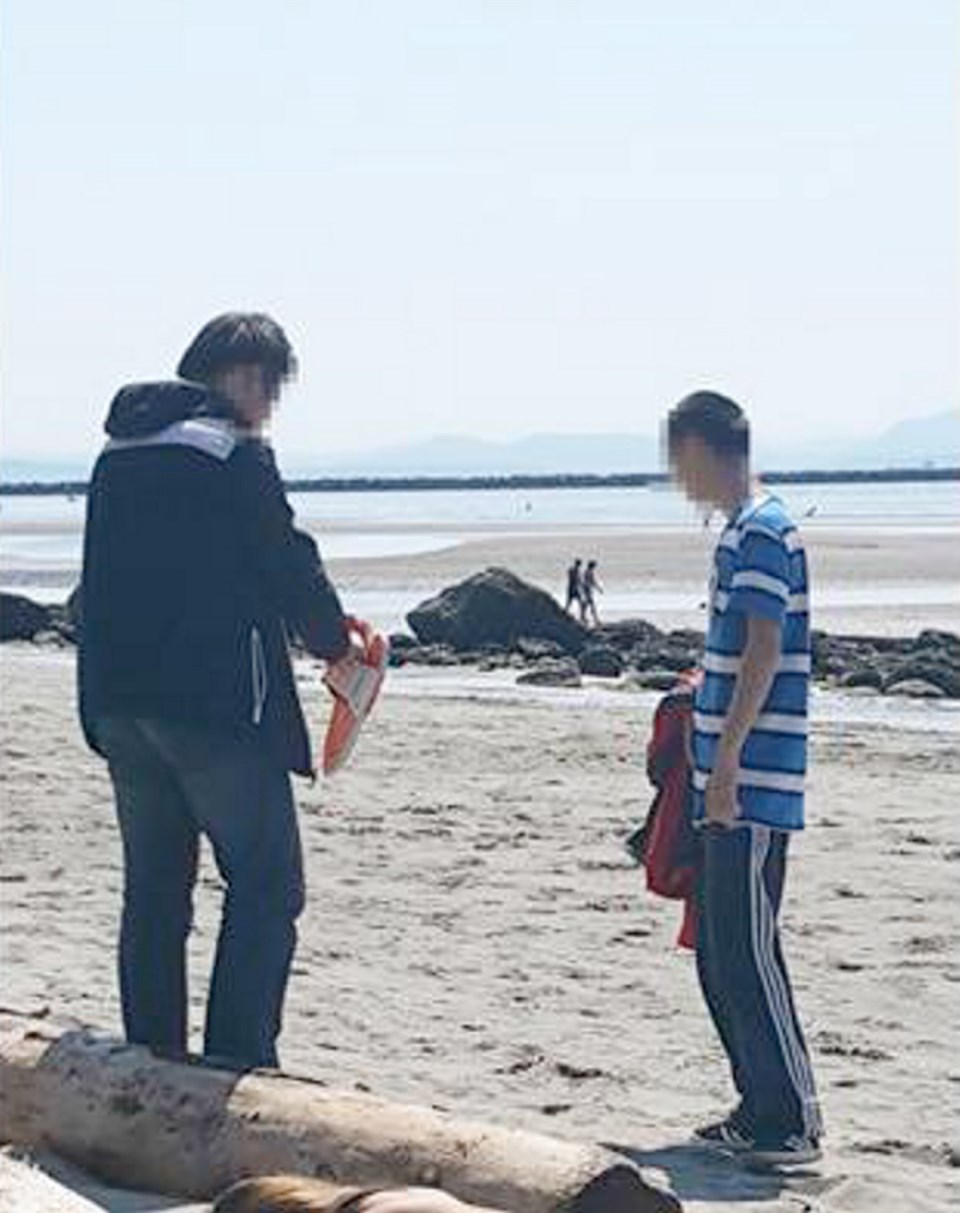Can nude sunbathers who willingly expose themselves in public still expect to be protected by Canada’s voyeurism laws?
That knotty legal question, which has been tested in an Ontario court, is now being explored by social media vigilantes at Vancouver’s famous clothing-optional Wreck Beach.
An unidentified Vancouver woman posted a photo on Reddit seeking to out and shame two “creepy” young men allegedly witnessed “covertly” taking phone camera images of an oblivious nude sunbather.
In the online forum, the woman claims that she saw the two men set up near the naked woman, who was lying face-down on the beach, and appear to work in tandem to surreptitiously capture video or photos. She informed the woman and pointed out the two men, who had walked away after being spotted.
“The lack of consent and blatant creepiness was un-nerving and I’m wondering if anyone recognizes them?” the Reddit user asked fellow nudists online.
Other nudists commented that the University of B.C. RCMP, which polices Wreck Beach, “aren’t doing anything and are claiming (that taking nude photos) is not against the law,” because the beach is public.
The issue of picture-taking of naked sunbathers at Wreck Beach has long been controversial.
Judy Williams of the Wreck Beach Preservation Society says beach regulars don’t appreciate being viewed like zoo animals or sex objects by fully-clothed tourists or suspected creeps, whether cameras are involved or not.
Society members issue “gawker” cards — something like a red card in soccer — to people who are rudely staring. And picture-takers are verbally warned that they should not take images without consent, and are sometimes told to leave.
Williams says the rise of social media and camera phones “has put a new twist on the gawker problem.” Nudists now have concerns their images will be posted online without consent. Reddit users have pointed to examples of video clips of Wreck Beach nudists posted to porn sites.
Williams — like many of the nudists commenting on Wreck Beach voyeurism online — stresses that Wreck Beach regulars are comfortable enforcing their own rules.
“The police do want to know (about alleged voyeurism) but they are between a rock and a hard place, since it is not illegal to take photos on a public beach,” Williams said. “But we are self-policing. It is possible that if people are taking photos surreptitiously, (nudists) will take the camera and fling it into the sea.”
UBC RCMP spokesman Sgt. Drew Grainger says that police could consider voyeurism charges if a photographer appears to be focusing on one person rather than the natural backdrop, but he is not aware of the RCMP issuing any such charges at Wreck Beach.
“When people choose to go nude there, it’s by their own will and desire,” Grainger said. “It’s a public park with beautiful landscape, so if someone was taking pictures of the beach they’re likely to capture somebody naked.”
In a March 2014 Ontario Court of Justice ruling, Justice Melvyn Green dismissed voyeurism and mischief charges against a Toronto man. In August 2012 the defendant, Harvey Lebenfish went to Hanlan’s Point, a “clothing-optional” public beach, with his nine-month old son in a stroller. He took dozens of photos of naked women. One woman was warned by another that she had been pictured from behind, and the woman confronted Lebenfish and reported him to lifeguards, who called police. Police arrested Lebenfish, who was nude except for a hat, and charged him.
He had agreed to delete photos of the woman, but she complained that she felt “violated” by having naked photos taken without her consent. Justice Green said the case “gives rise to several complex and relatively novel issues.”
The judge ruled that two key points needed to establish the charge of voyeurism — that Lebenfish took photos surreptitiously, and the alleged victim had a “reasonable expectation” of privacy at a public beach — were not proven in the case. Green referred to a 2003 debate in the House of Commons on the formation of voyeurism laws in which Wreck Beach was cited.
Wreck Beach nudists had asked parliamentarians to protect them from being photographed nude at the beach, but parliamentarians didn’t agree. Vic Toews, the future Conservative Justice Minister, argued expectation of privacy doesn’t apply to public property and Wreck Beach “naturists sort of want it both ways.” Green writes that nudists might have a more reasonable expectation of privacy if municipal bylaws or official signage at public beaches supports their position.
In an interview David Fraser, a Halifax lawyer with expertise in privacy and Internet issues, told The Province that Justice Green’s ruling “was consistent with the wording in the (voyeurism) statute — but whether or not you have an expectation of privacy, at least in my view, is highly contextual.”
As for Wreck Beach vigilantes posting online photos of alleged “creepy” photographers, Fraser said “they are just enforcing their social norms.”
“If someone down there is exposing people in ways they don’t want to be exposed, maybe it is not unreasonable to think the tables might be turned on them.”



